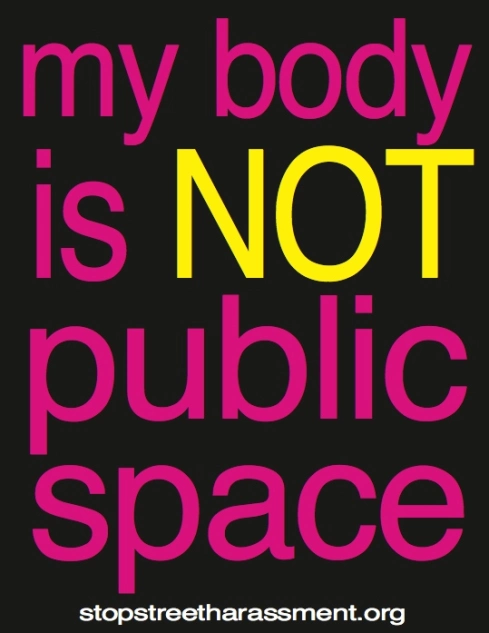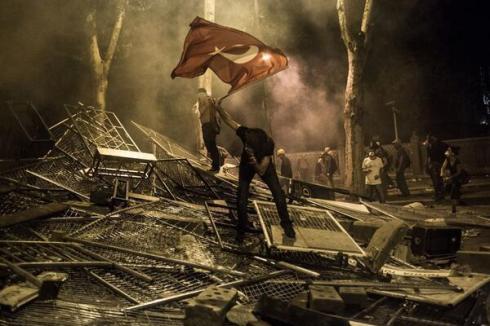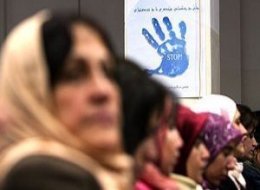 Militarization is the process of making society believe that violence, especially war, is an effective way to solve conflict to the point that any nonviolent attempt to solve conflict is snidely dismissed as ineffective, liberal, feminine, sissy or a whole host of other derogatorily used terms. The global problem of militarization takes different forms in every country, and even within each community. In Israel and Palestine troops attack women protesting the occupation. In Colombia women are participants and victims of violence perpetrated at every level of society. In Uganda those participating in the Walk to Work protest have been met with tear gas and bullets by the government’s security forces. I should be upfront here and say flat-out that I am very far left in my ideas of effective government: I don’t believe in borders or states. Imagine if the $553 billion defense bill just approved by the House was money spent on education, or healthcare, or ending violence….
Militarization is the process of making society believe that violence, especially war, is an effective way to solve conflict to the point that any nonviolent attempt to solve conflict is snidely dismissed as ineffective, liberal, feminine, sissy or a whole host of other derogatorily used terms. The global problem of militarization takes different forms in every country, and even within each community. In Israel and Palestine troops attack women protesting the occupation. In Colombia women are participants and victims of violence perpetrated at every level of society. In Uganda those participating in the Walk to Work protest have been met with tear gas and bullets by the government’s security forces. I should be upfront here and say flat-out that I am very far left in my ideas of effective government: I don’t believe in borders or states. Imagine if the $553 billion defense bill just approved by the House was money spent on education, or healthcare, or ending violence….
 Militarization is a gender issue. A gender issue is anything that disproportionately affects men, women, boys, girls and/or intersex or transgender adults or youth. Therefore, because militarization has a hugely disproportionate effect on men, men’s violences, and masculinities, it is a gender issue. It is also a gender issue in that anything defined as masculine can only be defined in opposition to that which is feminine, and because militarization of a given society negatively impacts men’s attitudes towards and treatment of women.
Militarization is a gender issue. A gender issue is anything that disproportionately affects men, women, boys, girls and/or intersex or transgender adults or youth. Therefore, because militarization has a hugely disproportionate effect on men, men’s violences, and masculinities, it is a gender issue. It is also a gender issue in that anything defined as masculine can only be defined in opposition to that which is feminine, and because militarization of a given society negatively impacts men’s attitudes towards and treatment of women.
 Many right-wing misogynists claim that feminists hate men, or that gender issues are only women’s issues, but militarization is a prime example of the genuine concern for well-being that many feminists around the world have for men who are part of the military. In graduate school one of my most influential professors, Dr. Sara Sharratt, opened my eyes to a reality that is often denied: killing people is not natural for anyone, male or female; men must be trained to kill. And as her work as a psychologist working with soldiers returning from war taught her, many men react negatively to having killed someone. The stress, trauma and horror that soldiers endure in battle is much too high a price for the false promise of “protecting freedom.”
Many right-wing misogynists claim that feminists hate men, or that gender issues are only women’s issues, but militarization is a prime example of the genuine concern for well-being that many feminists around the world have for men who are part of the military. In graduate school one of my most influential professors, Dr. Sara Sharratt, opened my eyes to a reality that is often denied: killing people is not natural for anyone, male or female; men must be trained to kill. And as her work as a psychologist working with soldiers returning from war taught her, many men react negatively to having killed someone. The stress, trauma and horror that soldiers endure in battle is much too high a price for the false promise of “protecting freedom.”
 Here in Turkey males are required by law to serve in the military, reinforcing the idea that there is honor in using violence. The belief in the effectiveness of violence is so strong in Turkey that even liberal, feminist groups condone the use of violence in protests and do not see the need or efficacy of strategic nonviolent action. Very few groups speak out against militarization here. One effect of this belief is that, according to a new report by Human Rights Watch, 47% of women in Turkey experience some kind of physical or sexual intimate partner violence within their lifetimes, regardless of education, class, religion, or region and much too few women’s shelters to accommodate the need. Violence between a couple is seen by police, the government, and society, to be a personal problem and victims are constantly told that they cannot expect their partners to be nonviolent.
Here in Turkey males are required by law to serve in the military, reinforcing the idea that there is honor in using violence. The belief in the effectiveness of violence is so strong in Turkey that even liberal, feminist groups condone the use of violence in protests and do not see the need or efficacy of strategic nonviolent action. Very few groups speak out against militarization here. One effect of this belief is that, according to a new report by Human Rights Watch, 47% of women in Turkey experience some kind of physical or sexual intimate partner violence within their lifetimes, regardless of education, class, religion, or region and much too few women’s shelters to accommodate the need. Violence between a couple is seen by police, the government, and society, to be a personal problem and victims are constantly told that they cannot expect their partners to be nonviolent.
 In the United States there is better enforcement of laws against domestic violence and yet 1 in 4 women and 1 in 9 men in the US are victims of intimate violence at some point in their lives. Militarization in America is slightly more subtle than in Turkey, but commercials to “Go Navy,” be “Army Strong,” and join “The Few, the Proud, the Marines” constantly inundate television viewers. At the same time military recruiters are present on junior high, high school and college campuses to convince children that the military is their best route out of their hometown. Militarization is therefore a compounded heap of inequalities: class, race, gender, education, location, language, ability, and age.
In the United States there is better enforcement of laws against domestic violence and yet 1 in 4 women and 1 in 9 men in the US are victims of intimate violence at some point in their lives. Militarization in America is slightly more subtle than in Turkey, but commercials to “Go Navy,” be “Army Strong,” and join “The Few, the Proud, the Marines” constantly inundate television viewers. At the same time military recruiters are present on junior high, high school and college campuses to convince children that the military is their best route out of their hometown. Militarization is therefore a compounded heap of inequalities: class, race, gender, education, location, language, ability, and age.
 Militarization in the US is forced on Americans at a very young age, when children at sporting events see the poorly named Blue Angels fly overhead with a roar as a giant American flag is unfurled across the playing field. The idealization of being a servant of war as a good, honorable thing is fed to Americans to serve the greed of the corporate world. We are taught from the time we can talk that America is the best place in the world, the most just, the most equal, the fairest. We have been lied to. We are told these things so that when our Commander-in-Chief calls on us to “protect freedom and liberty” and “stand up to injustice” our first response is to join the military killing machine so we can “serve our great nation.” This idea that the best thing a person can do for his country, the most masculine act possible, is serve in the military totally discounts the experiences of a great number of people in America including disabled men, transgender or intersex men, openly gay or bisexual men, men who believe in nonviolence, and women.
Militarization in the US is forced on Americans at a very young age, when children at sporting events see the poorly named Blue Angels fly overhead with a roar as a giant American flag is unfurled across the playing field. The idealization of being a servant of war as a good, honorable thing is fed to Americans to serve the greed of the corporate world. We are taught from the time we can talk that America is the best place in the world, the most just, the most equal, the fairest. We have been lied to. We are told these things so that when our Commander-in-Chief calls on us to “protect freedom and liberty” and “stand up to injustice” our first response is to join the military killing machine so we can “serve our great nation.” This idea that the best thing a person can do for his country, the most masculine act possible, is serve in the military totally discounts the experiences of a great number of people in America including disabled men, transgender or intersex men, openly gay or bisexual men, men who believe in nonviolence, and women.
 Unfortunately it is only after the damage of war has been done that many of the wide-eyed military recruits become hardened advocates for peace. The brave men and women who understand the error of the US’s ways in using violence and force to fill corporate pockets have formed a number of anti-war groups. Founded in 1985, Veterans for Peace, is seeking signatures for a petition to bring the troops home from Afghanistan. One of the newer organizations, Iraq Veterans Against the War, seeks an end to the occupations of Iraq and Afghanistan, and is pressuring the military to provide better care for returning vets. Vietnam Veterans Against the War states “We believe that service to our country and communities did not end when we were discharged. We remain committed to the struggle for peace and for social and economic justice for all people. We will continue to oppose senseless military adventures and to teach the real lessons of the Vietnam War. We will do all we can to prevent another generation from being put through a similar tragedy and we will continue to demand dignity and respect for veterans of all eras. This is real patriotism and we remain true to our mission.”
Unfortunately it is only after the damage of war has been done that many of the wide-eyed military recruits become hardened advocates for peace. The brave men and women who understand the error of the US’s ways in using violence and force to fill corporate pockets have formed a number of anti-war groups. Founded in 1985, Veterans for Peace, is seeking signatures for a petition to bring the troops home from Afghanistan. One of the newer organizations, Iraq Veterans Against the War, seeks an end to the occupations of Iraq and Afghanistan, and is pressuring the military to provide better care for returning vets. Vietnam Veterans Against the War states “We believe that service to our country and communities did not end when we were discharged. We remain committed to the struggle for peace and for social and economic justice for all people. We will continue to oppose senseless military adventures and to teach the real lessons of the Vietnam War. We will do all we can to prevent another generation from being put through a similar tragedy and we will continue to demand dignity and respect for veterans of all eras. This is real patriotism and we remain true to our mission.”
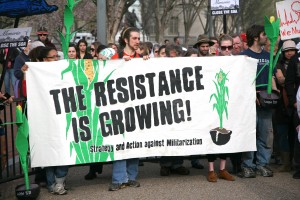 Cynthia Enloe renowned author and feminist, is one of the voices at the forefront of the anti-militarization effort. This piece nicely summarizes Enloe’s main arguments against militarization and its effects on women. Even non-governmental organizations, international organizations and peacekeeping missions are fraught with problems because of militarization, as Enloe and my professor Nadine Puechguirbal explain in a talk here on Haiti. For me, the most compelling argument against militarization is that violence does not work. It is ineffective! Nonviolent action, especially when used strategically, is an extremely effective tool for change and one that I hope more people will begin to utilize once they understand its efficacy. I will forever be indebted to Dr. Mary King for teaching me the strategy of nonviolence. In the future I will write a post summarizing the ideas behind SNVA.
Cynthia Enloe renowned author and feminist, is one of the voices at the forefront of the anti-militarization effort. This piece nicely summarizes Enloe’s main arguments against militarization and its effects on women. Even non-governmental organizations, international organizations and peacekeeping missions are fraught with problems because of militarization, as Enloe and my professor Nadine Puechguirbal explain in a talk here on Haiti. For me, the most compelling argument against militarization is that violence does not work. It is ineffective! Nonviolent action, especially when used strategically, is an extremely effective tool for change and one that I hope more people will begin to utilize once they understand its efficacy. I will forever be indebted to Dr. Mary King for teaching me the strategy of nonviolence. In the future I will write a post summarizing the ideas behind SNVA.
If you want to do something to help end the militarization that is damaging the world here are a few ideas: teach girls to be strong, both physically and emotionally; teach boys they have a right to feel emotions and express them; teach all children the importance of respectful problem solving and dialogue; teach young people that there are many ways they can serve their country other than military service, including the Peace Corps, AmeriCorps, Job Corps, the Medical Reserve Corps, Citizen Corps, the Civilian Response Corps, and Serve Corps, as well as through thousands of non-governmental and non-profit groups; learn about strategic nonviolent action and then share what you know; and most importantly, practice strategic nonviolent action to bring an end to injustices around the world!
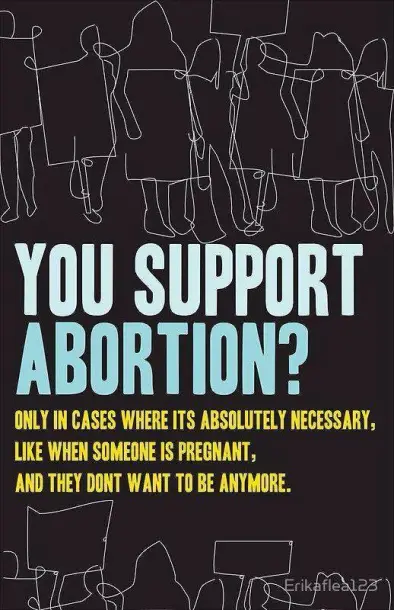 Today marks the 5th anniversary of Feminist Activism’s first blog post! To celebrate I’m counting down my top five favorite posts from throughout the years. They’re not necessarily the posts that have gotten the most views or interactions, but they’re the ones I think have been most poignant. If your top five would be different, tell everyone which posts you’d have preferred in the comments. Thanks for being a part of my life, and for helping make the world a better place for the past half-a-decade, and here’s to 50 more years of Feminist Activism!
Today marks the 5th anniversary of Feminist Activism’s first blog post! To celebrate I’m counting down my top five favorite posts from throughout the years. They’re not necessarily the posts that have gotten the most views or interactions, but they’re the ones I think have been most poignant. If your top five would be different, tell everyone which posts you’d have preferred in the comments. Thanks for being a part of my life, and for helping make the world a better place for the past half-a-decade, and here’s to 50 more years of Feminist Activism!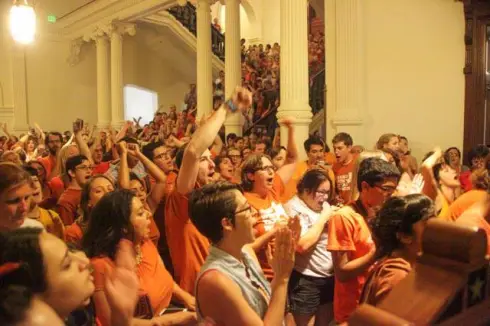
 4. Religion and Modest Dress
4. Religion and Modest Dress 1. Socially Constructed Gender Roles: The Root of All Evil
1. Socially Constructed Gender Roles: The Root of All Evil
